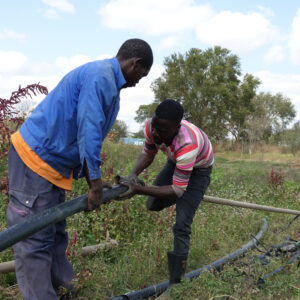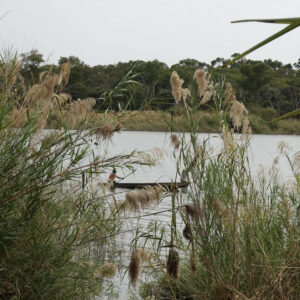“Life is based on biology, not chemistry. Therefore, the future of farming in Africa is organic”, brother Paul Desmarais SJ, the director of Kasisi Agricultural Training Centre (KATC), told me.

Zambian famers assemble watering systems for organic farming.
October 15, 2022
Zambia’s efforts to prevent famine and poverty with organic farming
As Africa faces a food crisis, accelerated by the spillover of the war in Ukraine, according to him, with the right changes made, this crisis could not only be prevented, but millions could also be lifted out of extreme poverty.
Zambia is a country landlocked in central southern Africa, between Zimbabwe and the Democratic Republic of Congo. It has a population of over 19 million people, out of which 58.7% lives below the income poverty line, defined by the United Nations as means of less than $1.90 per day per person. With a fast-growing population and high poverty rates, food security and development are vital objectives for the Zambian government.
Agriculture made up only 3.4% of Zambia’s GDP in 2021 but is responsible for over half of all employment. In a country with an unemployment rate of 13.03%, agriculture provides vital income for smallholder farms and helps to guarantee food security. Crucially, agriculture has great growth potential: Zambia has at least 3.8 million hectares of arable land that is vastly underutilised. Arguably, the development of agriculture can lift millions out of extreme poverty in Zambia – and elsewhere in Africa.
There are challenges in developing agriculture. Rapidly rising costs have made it harder for smallholder farmers to meet their basic needs, while prices of goods used in traditional farming, from fuel to fertilisers, have risen dramatically. Global prices of fertilisers have risen by 30% since the start of 2022.
In addition, the methods used by Zambian farmers have significant negative consequences. Frequent overuse of chemical fertilisers and pesticides damages the soil, increasing acidity, and kills vital microbiological activity, rendering lower yields in the future. Ammonia emissions from urea used in farming has consequences on the environment: it is absorbed through the soil by the water system, which causes the production of toxins and algal blooms, damaging fish stocks and reducing a key source of income for Zambia’s numerous fishermen.
Mentioned in this article:
a method used in agriculture, originating from Japan. Bokashi is the product of food waste, manure and similar organic matter conversion through fermentation into organic fertiliser, which improves the soil and increases crop yields without the negative externalities of chemical methods. In contrast to compost, which can take months to prepare, Bokashi takes only seven to 14 days to ferment.
Organic farming is a potential answer to many of these barriers. It requires less startup capital and can provide a healthier, more sustainable method of developing smallholder farms.
Many organisations are trying to promote organic farming. One is the Kasisi Agricultural Training Center (KATC), founded in 1974 by the Jesuits and located a 30-minute drive north of the capital Lusaka. Initially, it was set up to teach the traditional methods involving chemical fertilisers and pesticides. Like many others, those at the KATC recognised the long list of problems arising from chemical farming, so the organisation changed to organic farming in the mid-1980s to promote a healthier, more sustainable way of living. Since 1990, the KATC has been entirely organic.
One of the main benefits of organic farming is that it is less vulnerable to external price shocks. Compost or Bokashi, alternatives to chemical fertilisers are produced using waste materials such as animal manure and plant matter and, as they can be sourced locally without high transport costs, are not as affected by price changes. Price stability is crucial for farmers with minimal profit margins and no financial safety net.
An essential organic farming process is plant variation, which provides a diverse ecological system and results in higher resistance to disease and insects. Diversification reduces the vulnerability of smallholder farmers to large-scale losses of crops, helping to avoid spikes in poverty levels often seen following the spread of blight.

A Zambian fisherman. Picture by Emrys Rosser.
Organic farming is not a simple solution. While organic farming has lower financial barriers, it has significant knowledge barriers. A wide range of skills and expertise are needed for a successful organic farm: compost-making skills, management of a diverse range of crops, appropriation of crop rotation, and methods of weeding. Few smallholder farms in Zambia are currently in command of these skills, and many find straightforward chemical procedures to be the only way.
The main focus of KATC’s work is to train farmers and government agents in the basics of organic farming. They provide training from short two-week courses up to two-year diplomas.
Training government agricultural officers can have a multiplier effect, with each of these agents being able to travel around Zambia and pass on their skills. With a looming chemical fertiliser shortage in Zambia, there is also a push from KATC to engage the government in rapidly training thousands of government officials to use Bokashi. Hopefully, avoiding a fall in agricultural output and potential famine in the coming year as fertiliser prices continue to rise.
However, the current government policies in Zambia are tailored towards supporting chemical processes. To help smallholder farmers earn a more substantial living, the government introduced a subsidy programme called the Farmer Input Support Programme (FISP) in 2002/3. The goal of this subsidy was to increase the production of maise by providing chemical fertilisers that should facilitate its growth. These subsidies distort price signals, incentivising the overuse of fertilisers and, as the subsidy renders farming profitable, creating a dependency on government’s handouts. The opportunity cost of this subsidy, up to 60% of Zambia’s agricultural budget, could be used on organic training, which represents a one-off cost and leaves farmers more self-reliant.
The KATC also organises the work of an organic farm at Kasisi, which grows a wide variety of herbs and vegetables to be sold in local markets. The farm, which employs locals in the village, particularly women, was founded in 1992 by Jesuit Tadeusz, and is now a crucial lifeline for many families.
One of the women I spoke to, Judith, a mother of three, has worked at Kasisi for three years and can now support her family on the income she receives. Her husband, a trained bricklayer, struggles to find permanent work.
While the income from agriculture helps, it is often not enough. Another worker at Kasisi farm, the site manager, Boyd, who supports his wife, two children and his younger sisters. Boyd, as a supervisor on a trial period, has a relatively good salary of 2,000 kwacha ($122) per month, which is set to rise if his contract is extended.
However, as a result of increased food and energy costs, Boyd considers 2,000 kwacha to be insufficient and estimates the minimum he needs to support his family stands at 4,000 kwacha.
While organic farming is not an easy solution that will solve all of Zambia’s problems overnight, it provides a step in the right direction, helping to lift millions out of extreme poverty and is becoming increasingly vital as the stresses of Ukraine now impact Africa.
Without the ability to be more self-reliant as a continent within agriculture, there is a risk of famine in the coming years. If governments act now to spread the methods and provide the necessary training, it is possible that agricultural output may even increase.




